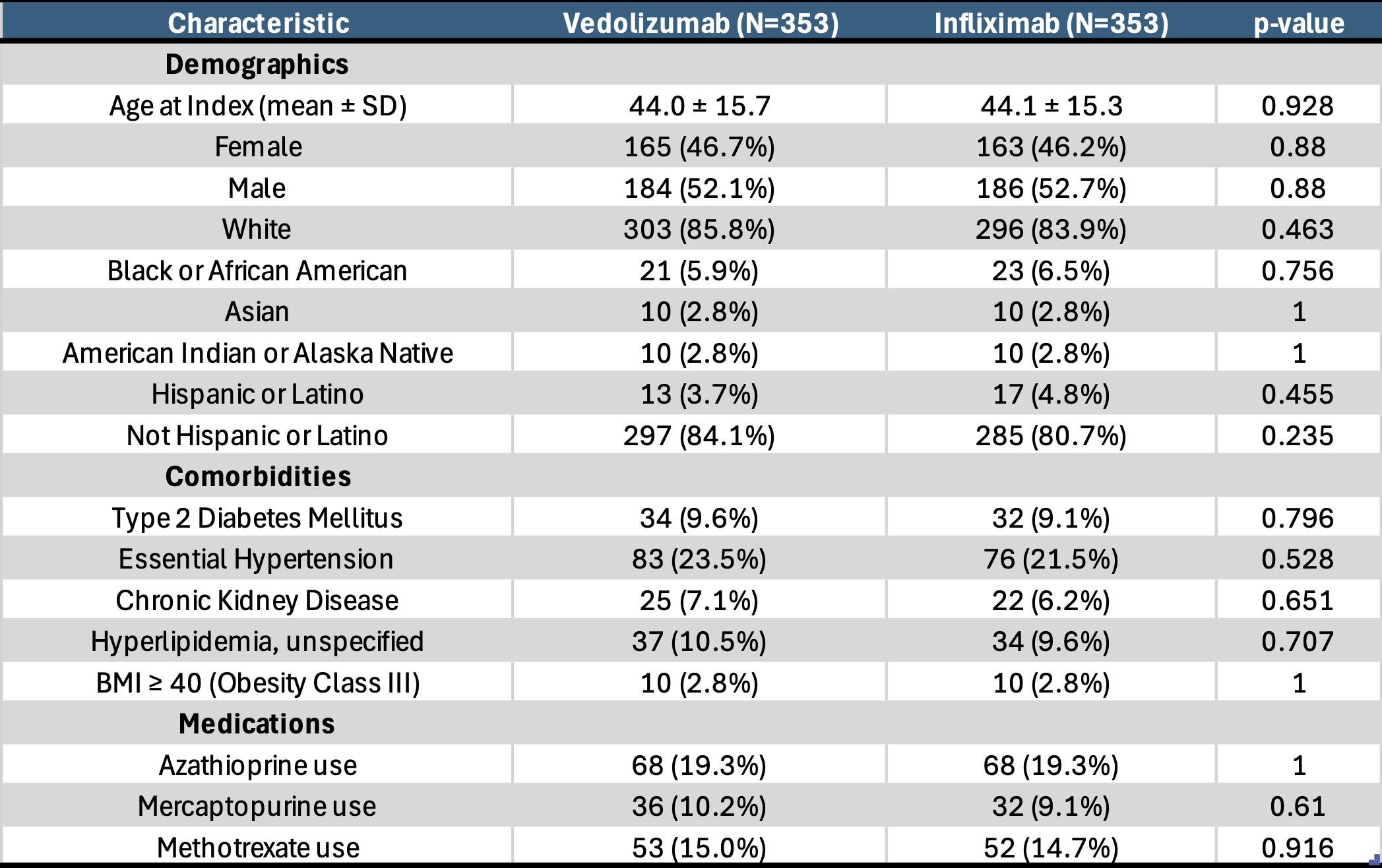Tuesday Poster Session
Category: IBD
P5330 - Comparative Effectiveness of Vedolizumab vs Infliximab in the Management of Pouchitis: A Propensity-Matched Analysis
Tuesday, October 28, 2025
10:30 AM - 4:00 PM PDT
Location: Exhibit Hall

Mohamed Nadeem, MD
Cleveland Clinic Foundation
Fairview Park, OH
Presenting Author(s)
Mohamed Nadeem, MD1, Prabhat Kumar, MD2, Taha Qazi, MD3, Raseen Tariq, MD4, Manuel Braga Neto, MD, PhD5
1Cleveland Clinic Foundation, Fairview Park, OH; 2Virginia Commonwealth University, Richmond, VA; 3Cleveland Clinic Foundation, Cleveland, OH; 4Virginia Commonwealth University Health System, Richmond, VA; 5Cleveland Clinic, Cleveland, OH
Introduction: Pouchitis is the most common complication after ileal pouch-anal anastomosis (IPAA) in patients with ulcerative colitis (UC). Infliximab and recently vedolizumab are increasingly being used for chronic pouchitis. We aimed to compare clinical outcomes among patients treated with infliximab versus vedolizumab using a large real-world federated EHR network.
Methods: We utilized the TriNetX Global Collaborative Network to identify adults (≥18 years) diagnosed with pouchitis with prior UC, who received either infliximab or vedolizumab after IPAA. Cohorts were mutually exclusive and excluded patients with concurrent C. difficile infection. Propensity score matching (1:1) was performed to balance demographics and comorbidities. Outcomes assessed included all-cause hospitalization, pouch excision/ileostomy, pouchoscopy, and recurrent pouchitis over a 10-year follow-up. Measures of association, including risk difference, risk ratio, and odds ratio (OR), confidence intervals (CI), and p values were calculated.
Results: In the vedolizumab versus infliximab group (n=353 each), the risk of hospitalization was similar between groups (40.2% vs. 44.5%; OR 0.84, 95% CI 0.62–1.13; p=0.253). Vedolizumab was associated with a significantly lower risk of pouch excision or ileostomy (20.7% vs. 27.8%; OR 0.68, 95% CI 0.48–0.96; p=0.028). In contrast, pouchitis recurrence was significantly more common in the vedolizumab group (75.1% vs. 64.6%; OR 1.65, 95% CI 1.19–2.29; p=0.002). Pouchoscopy rates were numerically higher with vedolizumab but did not reach statistical significance (53.8% vs. 47.3%; OR 1.30, 95% CI 0.97–1.75; p=0.083).
Discussion: Vedolizumab use in patients with pouchitis was associated with lower rates of pouch excision but higher rates of pouchitis recurrence compared to infliximab. Further prospective studies are warranted to confirm this association.

Figure: Table 1. Baseline Characteristics of Cohorts in Comparative Analysis of Vedolizumab vs. Infliximab in the Management of Pouchitis

Figure: Table 2. Comparison of Clinical Outcomes of Vedolizumab vs. Infliximab in the Management of Pouchitis
Disclosures:
Mohamed Nadeem indicated no relevant financial relationships.
Prabhat Kumar indicated no relevant financial relationships.
Taha Qazi: Abbvie – Advisor or Review Panel Member, Advisory Committee/Board Member, Consultant, Grant/Research Support, Speakers Bureau. Celltirion – Grant/Research Support. Eli Lilly – Advisor or Review Panel Member, Advisory Committee/Board Member, Consultant. Johnson and Johnson – Advisor or Review Panel Member, Advisory Committee/Board Member, Consultant, Speakers Bureau. pfizer – Grant/Research Support.
Raseen Tariq indicated no relevant financial relationships.
Manuel Braga Neto indicated no relevant financial relationships.
Mohamed Nadeem, MD1, Prabhat Kumar, MD2, Taha Qazi, MD3, Raseen Tariq, MD4, Manuel Braga Neto, MD, PhD5. P5330 - Comparative Effectiveness of Vedolizumab vs Infliximab in the Management of Pouchitis: A Propensity-Matched Analysis, ACG 2025 Annual Scientific Meeting Abstracts. Phoenix, AZ: American College of Gastroenterology.
1Cleveland Clinic Foundation, Fairview Park, OH; 2Virginia Commonwealth University, Richmond, VA; 3Cleveland Clinic Foundation, Cleveland, OH; 4Virginia Commonwealth University Health System, Richmond, VA; 5Cleveland Clinic, Cleveland, OH
Introduction: Pouchitis is the most common complication after ileal pouch-anal anastomosis (IPAA) in patients with ulcerative colitis (UC). Infliximab and recently vedolizumab are increasingly being used for chronic pouchitis. We aimed to compare clinical outcomes among patients treated with infliximab versus vedolizumab using a large real-world federated EHR network.
Methods: We utilized the TriNetX Global Collaborative Network to identify adults (≥18 years) diagnosed with pouchitis with prior UC, who received either infliximab or vedolizumab after IPAA. Cohorts were mutually exclusive and excluded patients with concurrent C. difficile infection. Propensity score matching (1:1) was performed to balance demographics and comorbidities. Outcomes assessed included all-cause hospitalization, pouch excision/ileostomy, pouchoscopy, and recurrent pouchitis over a 10-year follow-up. Measures of association, including risk difference, risk ratio, and odds ratio (OR), confidence intervals (CI), and p values were calculated.
Results: In the vedolizumab versus infliximab group (n=353 each), the risk of hospitalization was similar between groups (40.2% vs. 44.5%; OR 0.84, 95% CI 0.62–1.13; p=0.253). Vedolizumab was associated with a significantly lower risk of pouch excision or ileostomy (20.7% vs. 27.8%; OR 0.68, 95% CI 0.48–0.96; p=0.028). In contrast, pouchitis recurrence was significantly more common in the vedolizumab group (75.1% vs. 64.6%; OR 1.65, 95% CI 1.19–2.29; p=0.002). Pouchoscopy rates were numerically higher with vedolizumab but did not reach statistical significance (53.8% vs. 47.3%; OR 1.30, 95% CI 0.97–1.75; p=0.083).
Discussion: Vedolizumab use in patients with pouchitis was associated with lower rates of pouch excision but higher rates of pouchitis recurrence compared to infliximab. Further prospective studies are warranted to confirm this association.

Figure: Table 1. Baseline Characteristics of Cohorts in Comparative Analysis of Vedolizumab vs. Infliximab in the Management of Pouchitis

Figure: Table 2. Comparison of Clinical Outcomes of Vedolizumab vs. Infliximab in the Management of Pouchitis
Disclosures:
Mohamed Nadeem indicated no relevant financial relationships.
Prabhat Kumar indicated no relevant financial relationships.
Taha Qazi: Abbvie – Advisor or Review Panel Member, Advisory Committee/Board Member, Consultant, Grant/Research Support, Speakers Bureau. Celltirion – Grant/Research Support. Eli Lilly – Advisor or Review Panel Member, Advisory Committee/Board Member, Consultant. Johnson and Johnson – Advisor or Review Panel Member, Advisory Committee/Board Member, Consultant, Speakers Bureau. pfizer – Grant/Research Support.
Raseen Tariq indicated no relevant financial relationships.
Manuel Braga Neto indicated no relevant financial relationships.
Mohamed Nadeem, MD1, Prabhat Kumar, MD2, Taha Qazi, MD3, Raseen Tariq, MD4, Manuel Braga Neto, MD, PhD5. P5330 - Comparative Effectiveness of Vedolizumab vs Infliximab in the Management of Pouchitis: A Propensity-Matched Analysis, ACG 2025 Annual Scientific Meeting Abstracts. Phoenix, AZ: American College of Gastroenterology.

